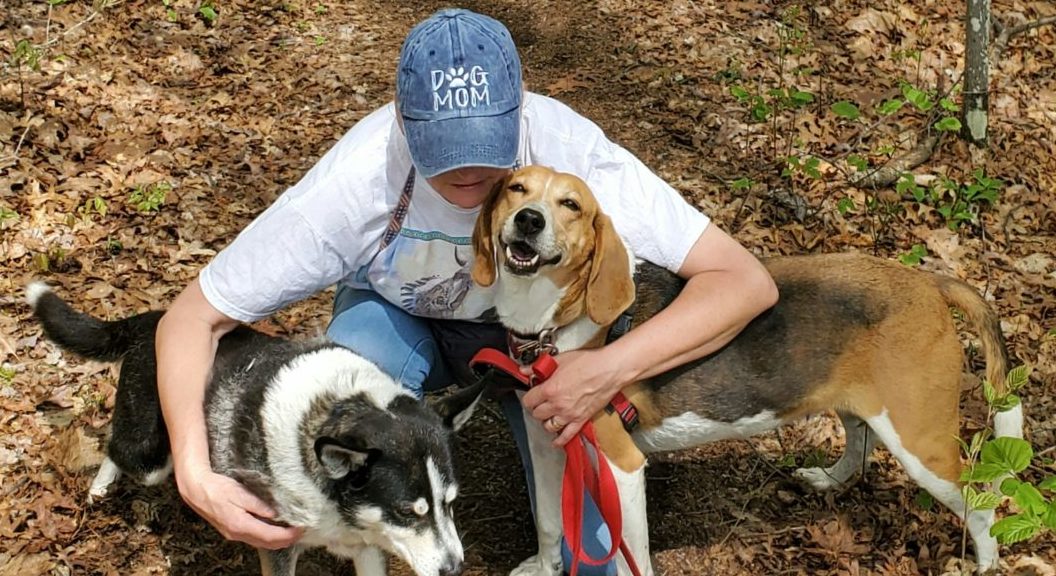This post first appeared on Care2.com
My friend Joy sent me a photo of her 7-pound mini dachshund, Rosalie, hanging out in a front dog carrier. Rosalie is usually running or playing in her yard with her doggie siblings or walking on the beach with mom. On this day she was in the carrier for her safety because the family was hanging out at the Purina Woofstock event in San Juan, PR, where they were surrounded by people and large dogs.
Trainers say there are definitely times when small dogs need to be picked up and carried for their protection. For example when around large crowds of people or dogs, at gatherings when there are lots of children who could unintentionally hurt the dog, on long hikes or walks when a little dog might not have the stamina to go the full distance and when visiting stores or malls that allow small dogs.
 Mini Dachshund, Rosalie, safely tucked inside a carrier at the Purina Woofstock event in San Juan, PR. At home, Rosalie enjoys running and playing in the yard with her siblings.
Mini Dachshund, Rosalie, safely tucked inside a carrier at the Purina Woofstock event in San Juan, PR. At home, Rosalie enjoys running and playing in the yard with her siblings.
Problems occur, according to trainers, when owners start treating their small dogs like babies and carry them everywhere.
“Dogs were given four legs for a reason, they are supposed to walk,” said Eileen Haley of Second Chance Dog Training Services, Inc. in Bergen County, NJ. “By carrying a small dog everywhere you are depriving them of the opportunity for mental and physical stimulation because they are not getting a chance to sniff and explore.”

A small dog’s world would be much more enriched if they were allowed to fully experience it, Haley said. Their sense of smell is an important component of how they sense the world. Yes, they can look around while snuggled inside a backpack or settled in a stroller but their sense of smell gives them much more information.
In addition, experts say this lack of exercise and stimulation can lead to behavioral problems. In her “Smaller dogs, bigger problems” blog, Jennifer Cattet, canine behaviorist and trainer, wrote that: “Pint-size pooches are treated with much love and affection, but unfortunately, they’re not taught basic coping skills that larger dogs generally acquire naturally through their exposure to the world. When a dog is constantly touched, carried and loved on while we’re around, how will he feel once alone?”
Trainers say that the constant babying of little dogs can lead to such problems as separation anxiety, aggression, hyperactivity and reactivity.
“By all means coddle your dog but be aware of your dog’s personal boundaries,” Haley said. “Some dogs want to be hugged or love to be held and cannot get enough attention. Others like to be with you but they don’t need you in their face. If you’re going to have a relationship with any being you have to be respectful of their space as well as your own.”
Here are Haley’s tips for living a happy healthy life with small dogs:
- Many small dog owners don’t bother to train their dogs. If the dog is acting up, they simply swoop down and pick him up. But as with children, if you want your dog to be a well-behaved family member, you need to teach him how to behave. Dogs are like children and can get into trouble when they don’t have rules and boundaries.
- Positive reinforcement based training is great for dogs. Little dogs can do everything big dogs can do and it’s so cute to see the little guys doing obedience training. All dogs love this type of training because they are getting positive attention and rewards in the form of treats, pats, praise or playtime. It’s a great way to bond with your little dog while teaching her good manners.
- Escalating aggression is not unusual in small dogs who are constantly forced to submit to unwanted touch. Look at life from your little dog’s perspective and respect her boundaries. Understand that while some dogs love attention and love being petted, others do not. Never force your dog into the arms of a stranger if your dog is uncomfortable with this. If you’re carrying your little dog—either in your arms or in a backpack or stroller—and she is uncomfortable with an approaching stranger, remove your dog from the situation (if there is a socialization issue it can be counter-conditioned in training). You never want your dog to feel trapped.
- Young children tend to view small dogs as stuffed animals to be picked up and cuddled. Children should be asked how they would feel if someone was constantly touching them and picking them up and carrying them around? This helps them to make a connection and teaches them respect for the little dog’s space.
